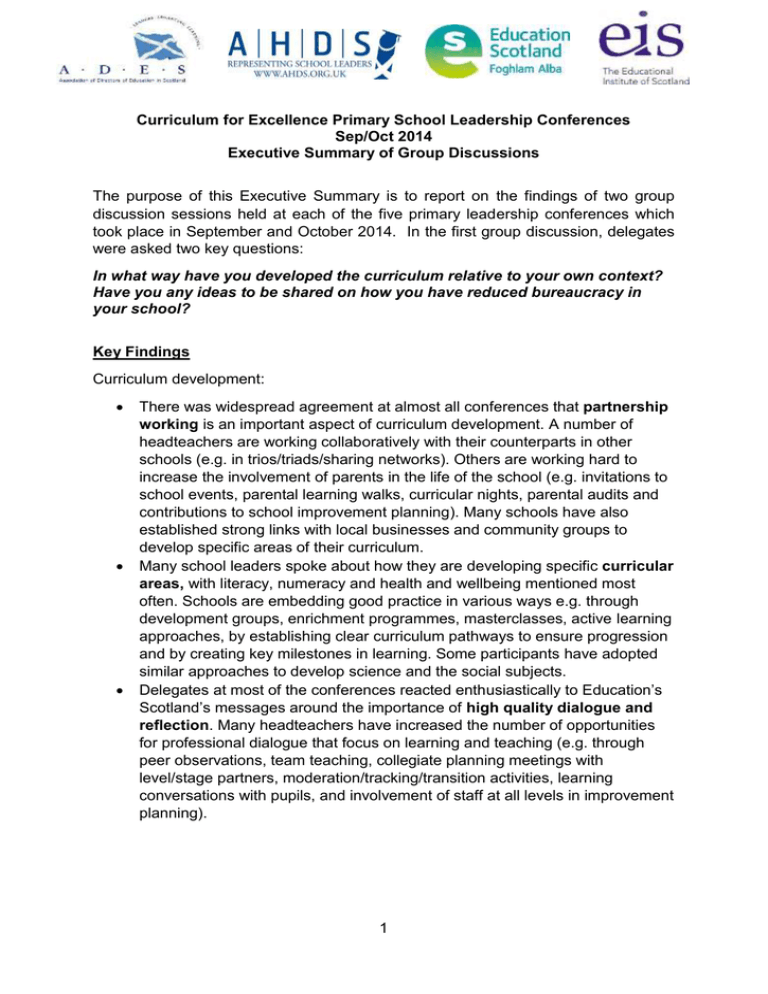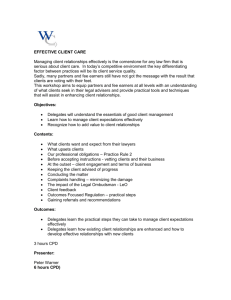Curriculum for Excellence Primary School Leadership Conferences Sep/Oct 2014
advertisement

Curriculum for Excellence Primary School Leadership Conferences Sep/Oct 2014 Executive Summary of Group Discussions The purpose of this Executive Summary is to report on the findings of two group discussion sessions held at each of the five primary leadership conferences which took place in September and October 2014. In the first group discussion, delegates were asked two key questions: In what way have you developed the curriculum relative to your own context? Have you any ideas to be shared on how you have reduced bureaucracy in your school? Key Findings Curriculum development: There was widespread agreement at almost all conferences that partnership working is an important aspect of curriculum development. A number of headteachers are working collaboratively with their counterparts in other schools (e.g. in trios/triads/sharing networks). Others are working hard to increase the involvement of parents in the life of the school (e.g. invitations to school events, parental learning walks, curricular nights, parental audits and contributions to school improvement planning). Many schools have also established strong links with local businesses and community groups to develop specific areas of their curriculum. Many school leaders spoke about how they are developing specific curricular areas, with literacy, numeracy and health and wellbeing mentioned most often. Schools are embedding good practice in various ways e.g. through development groups, enrichment programmes, masterclasses, active learning approaches, by establishing clear curriculum pathways to ensure progression and by creating key milestones in learning. Some participants have adopted similar approaches to develop science and the social subjects. Delegates at most of the conferences reacted enthusiastically to Education’s Scotland’s messages around the importance of high quality dialogue and reflection. Many headteachers have increased the number of opportunities for professional dialogue that focus on learning and teaching (e.g. through peer observations, team teaching, collegiate planning meetings with level/stage partners, moderation/tracking/transition activities, learning conversations with pupils, and involvement of staff at all levels in improvement planning). 1 Tackling bureaucracy: The majority of participants recognised the importance of tackling bureaucracy and most were very clear about the need to streamline planning processes. A significant number of participants spoke positively about the impact of collaborative planning, and increased professional dialogue between staff at all levels has had on learning and teaching. There was widespread agreement that the main focus of this dialogue should be on learners’ progress and achievements. Many headteachers no-longer collect in bulky forward plans, some have pared back planning paperwork and a smaller number have moved to electronic planning formats. Various other approaches to reducing workload were also discussed at each conference. Staff in some schools meet regularly to review and adapt planning, monitoring and reporting systems that take time away from teaching. As a result, some schools have developed shorter pupil progress reports for parents and have streamlined school improvement plans and monitoring paperwork. A number of delegates spoke about increasing parental involvement in their schools’ planning processes whilst others have ‘bundled’ Es & Os to identify those that do not need to be planned for by class teachers. In the second group discussion, delegates were asked the following questions: What are the key challenges you have faced in developing the curriculum and how have you overcome them? What have we learned from our experiences so far? What further support is needed? Key challenges: A high number of participants expressed significant concerns around staffing issues. More specifically, headteachers are worried by the lack of supply teachers to cover absences or to release permanent staff for development work, which often results in senior leaders covering classes themselves. As a result, ensuring that all staff receive their non-class contact time (NCCT) is problematic for some schools. A lack of time to reflect, consolidate and embed practice was another issue of concern. A number of headteachers complained about a lack of leadership time whilst others were of the opinion that the pace of change has been too fast and more time to engage in strategic thinking, planning and collegiate working would be beneficial. Solutions: Sharing good practice emerged as a prominent theme at most conferences. Many headteachers are providing teaching staff with opportunities to learn from colleagues within their own establishments and within clusters (e.g. as ‘critical friends’, working with secondary colleagues to improve transitions, 2 peer observations to enhance learning and teaching, collaborative planning and professional enquiry sharing sessions). Those headteachers who are working with fellow cluster heads to develop aspects of their curriculum spoke positively about their experiences. Delegates also spoke more generally about the ways in which they have effectively managed change. A number of headteachers highlighted the importance of engaging in rigorous self-evaluation, being realistic about where the school is and choosing priorities carefully. Others spoke of the need to focus on one particular aspect of school improvement at a time and regularly review progress, recognising that ‘one size does not fit all’ and that changes may have to be made along the way. Across all conferences, staff involvement emerged as a prominent theme. Contributions emphasised the need to establish a collaborative and collegiate culture based on mutual trust within which staff have ownership of school improvement priorities. Some participants talked about the need to start with SMART targets and small steps to build teachers’ confidence within a supportive yet challenging framework, whilst recognising that everyone has something to give. Further support: Education Scotland specific: A high number of delegates called for more events like these, with some suggesting similar events for class teachers, PTs and DHTs. There were lots of positive comments about the ‘Primary Toolkit’ and delegates want to see it updated over time. Some welcomed Education Scotland’s forthcoming e-bulletins, whilst others regard it as yet something else to fill up their inbox. A number of participants would like to see the Education Scotland website content streamlined and welcomed the move towards a “3 clicks” interface. A significant number of delegates highlighted the need for Education Scotland and Local Authorities to communicate more effectively to ensure that key messages are clear and consistent. Some headteachers would like access to anonymised RIFs to illustrate what ‘good’, ‘very good’ and ‘excellent’ looks like in practice, whilst others would like to see more examples of planning, tracking, challenge, application and skills progression. Whilst practitioners welcome the ‘snippets’ of good practice published on the Education Scotland website, some have questioned why all materials are not published in their entirety for schools to adapt to their own context. Local authority specific: A number of delegates called for more opportunities to network and share good practice across authorities. Others would like local authorities to share with each other more effectively. A smaller number would like to see local authorities working more closely with teacher associations to look again at Working Time Agreements. There were also calls for greater support and direct input from QIOs and senior managers at local authority level. 3


